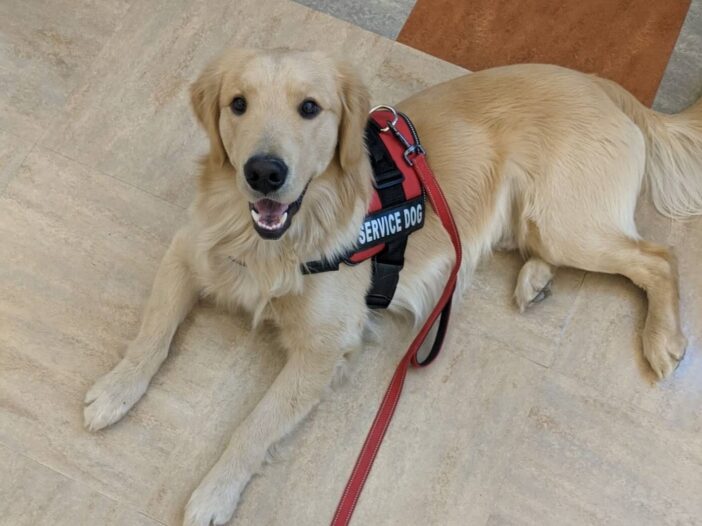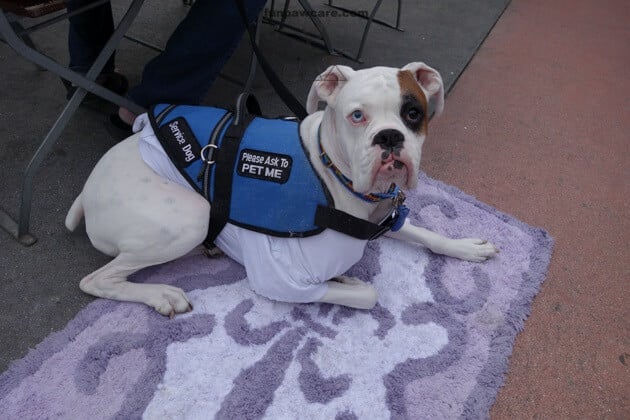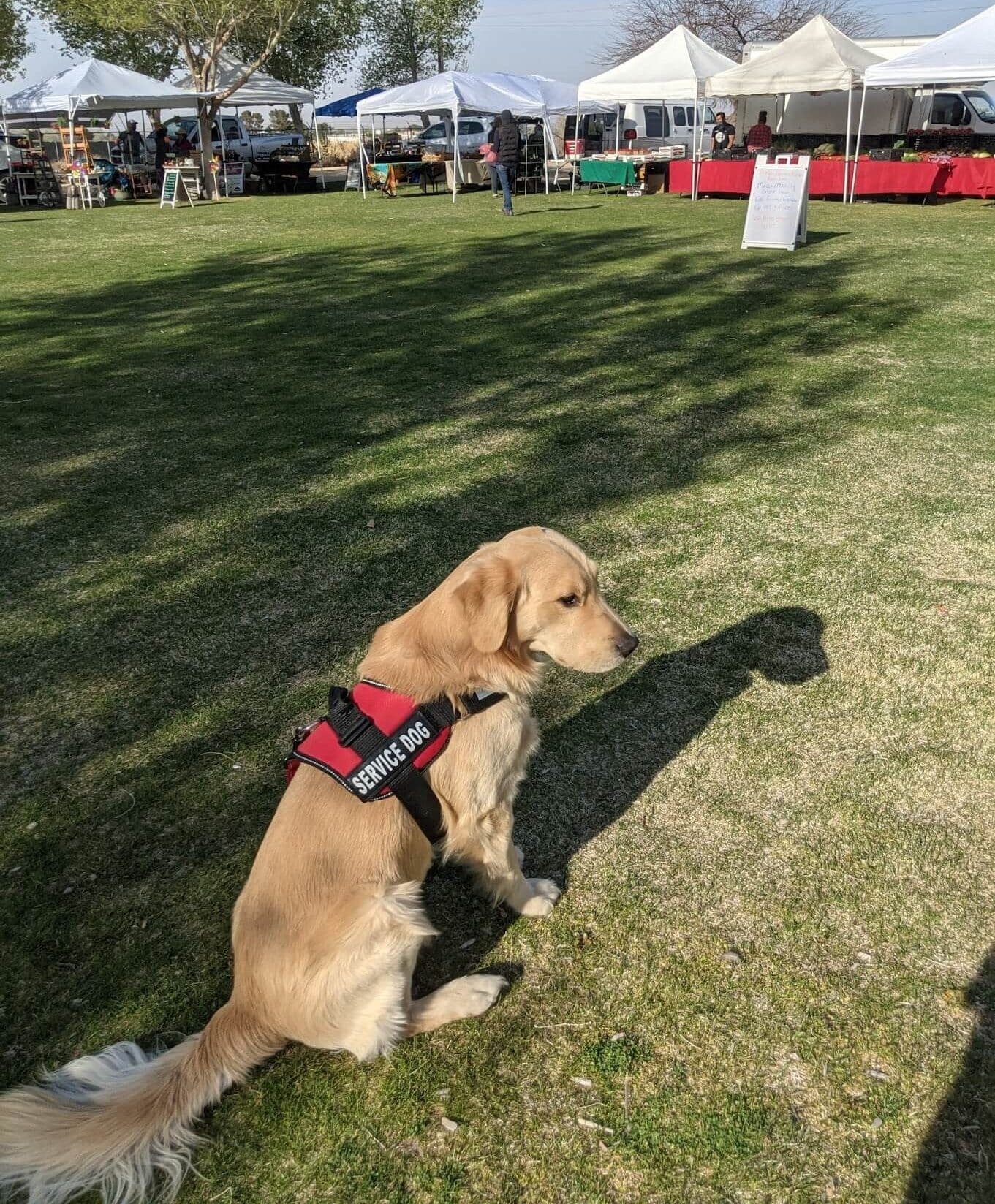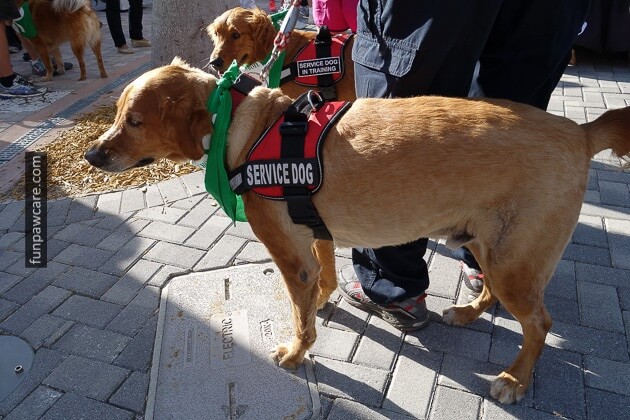
Psychiatric Service Dog Training
Here is a jump-to-table of contents. In this article I will discuss:
- What Is A Psychiatric Service Dog?
- Do I Qualify For A Psychiatric Service Dog?
- Psychiatric Service Dog Conditions
- Psychiatric Service Dog Training
- Psychiatric Service Dog Tasks
- How Can A Psychiatric Service Dog Help?
- PTSD Service Dogs
- Psychiatric Service Dogs For Veterans
- Psychiatric Service Dogs For Anxiety
- Psychiatric Service Dog Certification
- What’s The Difference Between A Psychiatric Service Dog And An Emotional Support Animal
- Psychiatric Service Dog FAQs
- Psychiatric Service Dog Training Considerations
What Is A Psychiatric Service Dog?
Psychiatric service dogs are known by many names such as PSD, PSD Dog, psychiatric service animal, psychiatric assistance dog, PTSD service dogs PTSD dog, etc. However, they all refer to types of psychiatric service dogs that help people with psychiatric, emotional, or cognitive disabilities.
Mental illness and psychological disabilities are as diverse as physical disabilities.
What is a psychiatric disability?
The legal definition according to the ADA (not according to the medical definition as per the Diagnostic and Statistical Manual of Mental Disorders, 5th edition {DSM-5}) of a disability that would warrant a service dog is as follows.
The ADA defines a person with a disability as a person who has a physical or mental impairment that substantially limits one or more major life activity. This includes people who have a record of such an impairment, even if they do not currently have a disability. It also includes individuals who do not have a disability but are regarded as having a disability.
The next logical question to getting a psychological service dog and seeing if you qualify for an anxiety service dog would be to ask what the ADA means when they state, “major life activity”.
The ADA defines major life activity as follows.
Major life activities are those functions that are important to most people’s daily lives. Examples of major life activities are breathing, walking, talking, hearing, seeing, sleeping, caring for one’s self, performing manual tasks, and working. Major life activities also include major bodily functions such as immune system functions, normal cell growth, digestive, bowel, bladder, neurological, brain, respiratory, circulatory, endocrine, and reproductive functions.
Psychiatric service dogs can help people with disabilities in a myriad of lifesaving ways which I’ll get into below.
Do I Qualify For A Psychiatric Service Dog?
In addition to the definition of a psychiatric disability as touched upon above, some other common questions I receive are, “What mental disabilities qualify for a service dog?” and “How can you tell if you qualify for a psychiatric service dog?”
According to the Anxiety and Depression Association of America (ADAA), around 15 million American adults have social anxiety disorder.
A staggering 19.1% of adults and approximately 32% of adolescents in the United States aged 13-18 are estimated to have an anxiety disorder.
These reported numbers are even lower than the actual number of people suffering from psychological, mental and emotional disorders because the statistics don’t account for children and all the people that don’t understand they have a disability or that don’t seek help.
There are as many ways where a PSD could help someone suffering from depression, anxiety, or with any of the following disorders.
Psychiatric Service Dog Conditions
- Anxiety
- Depression
- Post-Traumatic Stress Disorder (PTSD)
- Obsessive-Compulsive Disorder (OCD)
- Panic attacks
- Social phobias and anxiety disorders
- Phobias
- Agoraphobia
- Substance Abuse – or medication-induced anxiety disorders
- Selective Mutism
- Separation Anxiety Disorders
- Sleep Disorders
- Trauma (physical, mental, sexual, social, parental, emotional, etc.),
It’s important to note that a disability doesn’t have to fall under one of the above categories.
There are many more unlabeled ways in which a PSD can help someone.
Psychiatric Service Dog Training
Psychiatric service animal training depends on what psychological disability a person has.
Regardless of the disability a person has, service dog training always starts with “basic” training and public access training.
Once the dog proves to be a good candidate for a service dog, the service dog training then moves on to task training to mitigate an individual’s psychiatric disability.
Task training typically takes place only after a dog has a rock-solid temperament, and demeanor in most public spaces otherwise if a dog had fear anxiety, stress or arousal in these public areas, they wouldn’t make good service dogs.
Psychiatric service dog training for public access can take the longest time of the service dog training process.
During public access training, one must proof and generalize a dog’s behavior and tasks in so many environments in so many ways to make a dog fluent, attentive and responsive to the handler.
Here are more exact details and a service dog manual on how to make your dog a service dog.
Psychiatric Service Dog Tasks
Prior to task training a service dog needs rock-solid and fluent obedience training and be able to eagerly and happily perform all of these behaviors Sit, Down, Stand, Stay, Recall (Come), Heel, Retrieve, Drop It, Go To Mat/Place/Station, etc. in multiple environments with lots of distractions.
Task training like obedience training typically starts at home in the most boring familiar, non-distracting environment where a dog can focus and be conditioned to task training.
There are many tasks a psychiatric service dog can be trained to perform to help someone with a disability. Some of which are the following.
A psychiatric service dog can be trained to:
- Counterbalance a person
- Interrupt panic attacks and flashbacks
- Turn the lights on/off
- Retrieve medication (from a refrigerator, drawer, cupboard, etc.)
- Apply deep pressure – deep pressure task training is particularly helpful when a person suffers from anxiety attacks, PTSD, and is what many service dogs perform for veterans suffering from PTSD and anxiety disorders.
- Lead someone out of a crowded area. If someone is having a panic attack and or needs open space or to be led away from stimulus a dog can help go to a quiet less crowded place.
- Lick, paw, lean or sit on a person to shield or assist a person out of an episode or panic attack
- Apply tactile pressure to bring someone back to awareness
- Wake up a person
- Calm a person having an anxiety attack
- Disrupt emotional overload
- Get help when a person is unable to get help themselves
- Medication/food/water reminders
- Grounding a person having an anxiety attack or depressive episode
- Block unwanted advances in crowded spaces creating a safe space
- Bring a phone or personal items
- Open/close doors
- Stop repetitive obsessive-compulsive behaviors
- Conduct room searches to alleviate fears of intruders
How Can A Psychiatric Service Dog Help?
Psychiatric service dog training can help with a mental disability that can otherwise be invisible.
Many disabilities, disorders and diseases go unseen, unheard and undetected to us.
Psychiatric diseases are insidious and typically invisible to others.
In addition, people suffering from psychiatric disabilities might not know or think a service dog can help them even though they are struggling to get by day to day.
More specifically, many people wonder how service dogs for anxiety help with mental illness. In addition to the above psychiatric service animal tasks, a psychiatric service dog or service dog for anxiety can help with:
- Social interactions
- Improving relationships
- Forming and strengthening friendships
- Self-esteem
- Improving your quality of life
- Fulfillment and leading a happier and healthier life
- Addiction abatement
- Socialization
- Improve Processing
- Compassion toward oneself and others
- Mindfulness
This is just a short list of the many things a psychiatric service dog can help with.
PTSD Service Dogs
A PTSD service dog is a type of psychiatric service dog.
A PTSD service dog’s main focus is to help people who suffer from PTSD attacks.
A PTSD service dog can help with any of the above-mentioned psychiatric service dog tasks.
The benefits of a PTSD service dog have been studied and documented in a variety of psychiatric service dogs for veterans research papers.
Psychiatric Service Dogs For Veterans
Psychiatric service dogs for veterans help people cope with the emotional, psychological and cognitive trauma brought about while in service.
Veterans may be exposed to unique experiences that are extremely damaging to the psychology, emotional and cognitive functioning of a person.
Veterans in particular are highly prone to experience PTSD and other disabilities.
Psychiatric service dogs for veterans can provide ineffable value.
Psychiatric Service Dogs For Anxiety
I am often asked, how to get a service dog for anxiety. You can say that all psychiatric service dogs can help with anxiety to different degrees.
Anxiety, like many disabilities and disorders all fall on a scale from healthy eustress to light fear to paralyzing deadly phobias.
Where you lie on that continuum depends on how a psychiatric service dog for anxiety gets trained.
Tasks to mitigate fear, anxiety and stress can be found above in the psychiatric service dog tasks section.
Psychiatric Service Dog Certification
I am often asked how to get a psychiatric service dog certification or certificate. While psychiatric service dog certificates can make a person’s life easier it’s important to note that service dog certificates are not needed, don’t mean anything and hold no legal basis or authority to grant a person access to places where pets are not allowed.
Further, psychiatric service dog certification, certificate, and/or registration are not needed or required by the ADA and have no more value than the paper it is printed on.
It doesn’t afford anyone (dog or person) the right to do anything.
The ADA clearly states there is no need for service dog certification, registration, or certificates.
The ADA has no requirement for service animals to be “certified”. Service animal certificates provide the individual with a disability no more rights than an individual without one. And, while there are several online registries, including official looking ones, there is no need or requirement to register.
While some unethical companies simply sell psychiatric service dog certifications, be aware that California has just enacted service dog laws to crack down on the prevalence of online bogus therapists, health care professionals and companies cashing in on selling worthless service dog certificates.
In addition, I should note, that not only is it a crime to misrepresent one’s pet dog as a service dog but doing so is punishable by jail and fines in California
In California, a person must attest to such fact in an affidavit. A person who makes a false claim on this affidavit faces a possible six months in jail and/or $1,000 fine. Any person who knowingly and fraudulently represents himself or herself, through verbal or written notice, to be the owner or trainer of any canine licensed/qualified/identified as a guide, signal, or service dog shall be guilty of a misdemeanor punishable by imprisonment in the county jail not exceeding 6 months, by a fine not exceeding $1,000, or by both fine and imprisonment.
Don’t impersonate or misrepresent your pet as a fake service dog.
Beyond the legal ramifications, it has real-world consequences for people with disabilities and their ability to live life.
What’s The Difference Between A Psychiatric Service Dog And An Emotional Support Animal (ESA/ESD)
The ADA defines a psychiatric service dog as an animal that is individually task-trained.
Without the help of a PSD a disabled person would not be able to live.
An ESD/ESA is not task trained to mitigate a person’s disability. Providing comfort, emotional support, therapeutic benefits or well-being are not considered tasks or disabilities that would make it impossible to live without the help of a PSD.
For example, the federal ADA affords the parent of a Psychiatric service dog to go where most places where normal pets or ESD are not allowed. Such as when flying with your PSD. However, you may not fly with your ESA
Here’s more about emotional support dog training.
Psychiatric Service Dog FAQs
Types Of Service Dogs
There are many types of service dogs. Psychiatric service dogs are as vital as other types of service dogs to help mitigate someone’s disability.
The label Service Dog is the umbrella term however there are many types of service dogs and sub-types in each category.
For example, types of psychiatric service dogs may be the ones detailed above, (PTSD service dogs, service dogs for veterans, service dogs for autism, service dogs for anxiety, etc.) However, their main function is to help a person with a disability in their daily life.
Psychiatric Service Dog Breeds
All dogs are individuals. There is no one breed or mongrel that can only be a service dog.
You may see a lot of German Shepherd psychiatric service dogs, Golden Retriever and Labrador Retriever psychiatric service dogs however there is no best breed for service dogs.
The breed of the dog does not matter with regard to service dog training.
Regardless of dog breed, service dogs need to be impeccably public access trained and task trained.
However, it helps to be practical when thinking about the “best” psychiatric service dog breeds.
For example, if you want a PSD to apply deep pressure and you have a 10-pound service dog, that may not be appropriate or adequate.
Psychiatric Service Dog Training Considerations
It must be stated that if your psychiatric condition inhibits your ability to care for a service dog you should not get one.
A person’s ability to fully care for another sentient being has to be thought about thoroughly before getting a service dog
Even if someone needs a service dog and has a letter from their doctor (mental health professional) attesting to the fact that they qualify for a PSD, you still have to be able to meet the dog’s many needs.
A service dog is a resources intensive lifelong process and should not be taken lightly.
You should be thoroughly aware of the myriad of factors to consider from the dog’s perspective to your own unique situation.
It is recommended that a person meets with their mental health professional and their future Certified Service Dog Trainer and Behaviorist to discuss whether or not you can adequately care for a dog’s needs (feeding, training and behavior, equipment, veterinarian care, enrichment, grooming, etc.)
I have been training psychiatric service dogs, mobility, hearing impaired, and autism service dogs for 30 years. I sat on the board of directors and was chosen by 2 consecutive mayors for my expertise in service dog training.
For Certified Service Dog Training and Behavior in Los Angeles California, I offer a Service Dog Boot Camp. For others around the world, I speak with clients about their service dog questions via Phone/Video Consultations.





Psychiatric Service Dogs (PSDs) are dogs that are trained to perform specific tasks to assist individuals with mental health disabilities such as anxiety, depression, post-traumatic stress disorder (PTSD), and bipolar disorder.
The training process for PSDs typically involves several stages:
1. Basic obedience training: The dog must have basic obedience skills such as sit, stay, come, and heel.
2. Task training: The dog is then trained to perform specific tasks that are tailored to the needs of the individual with the mental health disability. Some common tasks for PSDs include:
– Providing deep pressure therapy to calm anxiety
– Interrupting repetitive or self-harming behaviors
– Retrieving medication
– Providing emotional support and comfort
3. Public access training: The dog must be trained to behave appropriately in public settings and must be able to remain calm and focused even in noisy and chaotic environments.
4. Certification: Once the dog has completed training, it may be eligible for certification through a recognized service dog organization. This certification can be important for legal protection and public access rights.
Thanks for your comment Manara. A few points and clarifications.
• Regarding certification, there are no established “recognized service dog organizations” or a list of who is established and recognized and who is not.
• Certification is not a factor in legal considerations and is not recognized by the ADA or federal laws.
• People with disabilities can train their own PSD and do not need to be a “recognized” or a “service dog organization” to do so. That loophole was purposefully and smartly left open so that people who don’t have a lot of money can train their own service dog.
• The direction of your list may be and often is different. For example, if a dog has emotional or cognitive issues or any type of fear, anxiety, stress or arousal issues and can not pass a PAT there is no need to do basic obedience training or task training concerning service dog work.
Thanks Russ